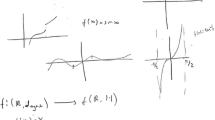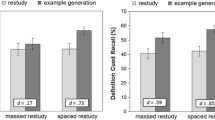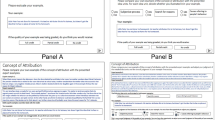Abstract
This study deals with the initial understanding that advanced undergraduate mathematics students exhibit when presented with a new concept in an environment requiring self-generation and self-validation of instances of the concept. Data were collected in spring of 1995 through interviews with 11 third and fourth year undergraduate mathematics students. We discuss the data from the perspective of the student's concept image and introduce the notion of learning event to indicate when a student communicates and applies a new understanding of a concept. We infer that the students in our study who employed an example generation learning strategy were more effective in attaining an initial understanding of the new concept than those who primarily employed other learning strategies such as definition reformulation or memorization.
Similar content being viewed by others
REFERENCES
Breidenbach, D., Dubinsky, E., Hawks, J. and Nichols, D.: 1992, ‘Development of the process conception of function’, Educational Studies in Mathematics 23, 247–285.
Davis, R.B. and Vinner, S.: 1986, ‘The notion of limit: Some seemingly unavoidable misconception stages’, Journal of Mathematical Behaviour 5(3), 281–303.
Eisenberg, T. and Dreyfus, T.: 1991, ‘On the reluctance to visualize in mathematics’, in W. Zimmermann and S. Cunningham (eds.), Visualization in Teaching and Learning Mathematics, MAA Notes Series 19, 25–37.
Ernest, Paul: 1991, The Philosophy of Mathematics Education, The Falmer Press, Taylor & Francis, Inc., Bristol, PA USA.
Hitt, Fernando: 1994, ‘Teachers' difficulties with the construction of continuous and discontinuous functions’, Focus on Learning Problems in Mathematics 16,n4, 10–20.
Leinhardt, G., Zaslavsky, O. and Stein, M.: 1990, ‘Functions, graphs, and graphing: Tasks, learning and teaching’, Review of Educational Research 60(1), 1–64.
Moore, R.C.: 1994, ‘Making the transition to formal proof’, Educational Studies in Mathematics 27, 249–266.
Selden, J. and Selden, A.: 1995, ‘Unpacking the logic of mathematical statements’, Educational Studies in Mathematics 29, 123–151.
Spangler, D.A.: 1992, ‘Assessing student beliefs about mathematics’, Arithmetic Teacher 40,n3, 148–152.
Tall, D.O.: 1992, ‘The transition to advanced mathematical thinking: functions, limits, infinity, and proof’, Handbook of Research on Mathematics Teaching and Learning, NCTM, p. 495–511.
Tall, D.O. and Vinner, S.: 1981, ‘Concept image and concept definition in mathematics, with particular reference to limits and continuity’, Educational Studies in Mathematics 12, 151–169.
Vinner, S.: 1989, ‘The avoidance of visual considerations in calculus students’, FOCUS: On Learning Problems in Mathematics 11, 149–156.
Vinner, S. and Hershkowitz, R.: 1980, ‘Concept images and common cognitive paths in the development of some simple geometrical concepts’, Proceedings of the Fourth International Conference for the Psychology of Mathematics Education, Berkeley CA, p. 177–184.
von Glasersfeld, E.: 1984, ‘An introduction to radical constructivism’, in P. Watzlawick (ed.), The Invented Reality, Norton, New York, p. 17–40.
Zimmermann, W. and Cunningham, S.: 1991, ‘Editors' introduction: What is Mathematical Visualization’, in W. Zimmermann and S. Cunningham (eds.), Visualization in Teaching and Learning Mathematics, MAA Notes Series 19, 1–7.
Author information
Authors and Affiliations
Rights and permissions
About this article
Cite this article
Dahlberg, R.P., Housman, D.L. Facilitating Learning Events Through Example Generation. Educational Studies in Mathematics 33, 283–299 (1997). https://doi.org/10.1023/A:1002999415887
Issue Date:
DOI: https://doi.org/10.1023/A:1002999415887




